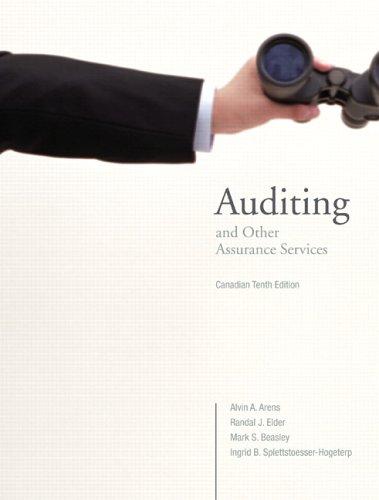Answered step by step
Verified Expert Solution
Question
1 Approved Answer
Audit Procedures for Auditor's Responsibility for Related Party Transactions Related party transactions are transactions between an entity and its related parties, such as affiliates, subsidiaries,
Audit Procedures for Auditor's Responsibility for Related Party Transactions
Related party transactions are transactions between an entity and its related parties, such as affiliates, subsidiaries, key management personnel, and their close family members. Auditors have a responsibility to assess related party transactions to ensure they are conducted on arm's length terms and adequately disclosed in the financial statements. Some audit procedures for addressing the auditor's responsibility for related party transactions include:
Obtaining a List of Related Parties: Auditors request management to provide a list of related parties and their relationships with the entity. This helps auditors identify parties with whom the entity may have transactions and assess the risk of related party transactions.
Reviewing Transaction Documentation: Auditors examine documentation supporting related party transactions, such as contracts, agreements, invoices, and correspondence. This enables auditors to verify the nature, terms, and conditions of the transactions and ensure they are conducted at arm's length.
Assessing the Business Purpose: Auditors evaluate the business purpose and economic substance of related party transactions to determine whether they are conducted for legitimate business reasons or for the benefit of related parties. Transactions lacking a clear business purpose raise concerns about potential conflicts of interest or manipulation.
Testing for Proper Authorization: Auditors test the authorization process for related party transactions to ensure they are approved in accordance with the entity's policies and procedures. Unauthorized transactions may indicate a lack of internal controls or potential fraud risk.
Comparing Terms to Market Rates: Auditors compare the terms and conditions of related party transactions to market rates or similar transactions with unrelated parties. Significant deviations from market rates may indicate preferential treatment or potential abuse of the related party relationship.
Evaluating Disclosure in Financial Statements: Auditors assess the adequacy and accuracy of disclosure related to related party transactions in the financial statements. Proper disclosure ensures transparency and allows users of the financial statements to understand the nature and significance of related party relationships and transactions.
Objective Type Question:
Which of the following audit procedures is used to ensure related party transactions are conducted at arm's length terms?
A Obtaining a List of Related Parties
B Reviewing Transaction Documentation
C Assessing the Business Purpose
D Comparing Terms to Market Rates

Step by Step Solution
There are 3 Steps involved in it
Step: 1

Get Instant Access to Expert-Tailored Solutions
See step-by-step solutions with expert insights and AI powered tools for academic success
Step: 2

Step: 3

Ace Your Homework with AI
Get the answers you need in no time with our AI-driven, step-by-step assistance
Get Started


